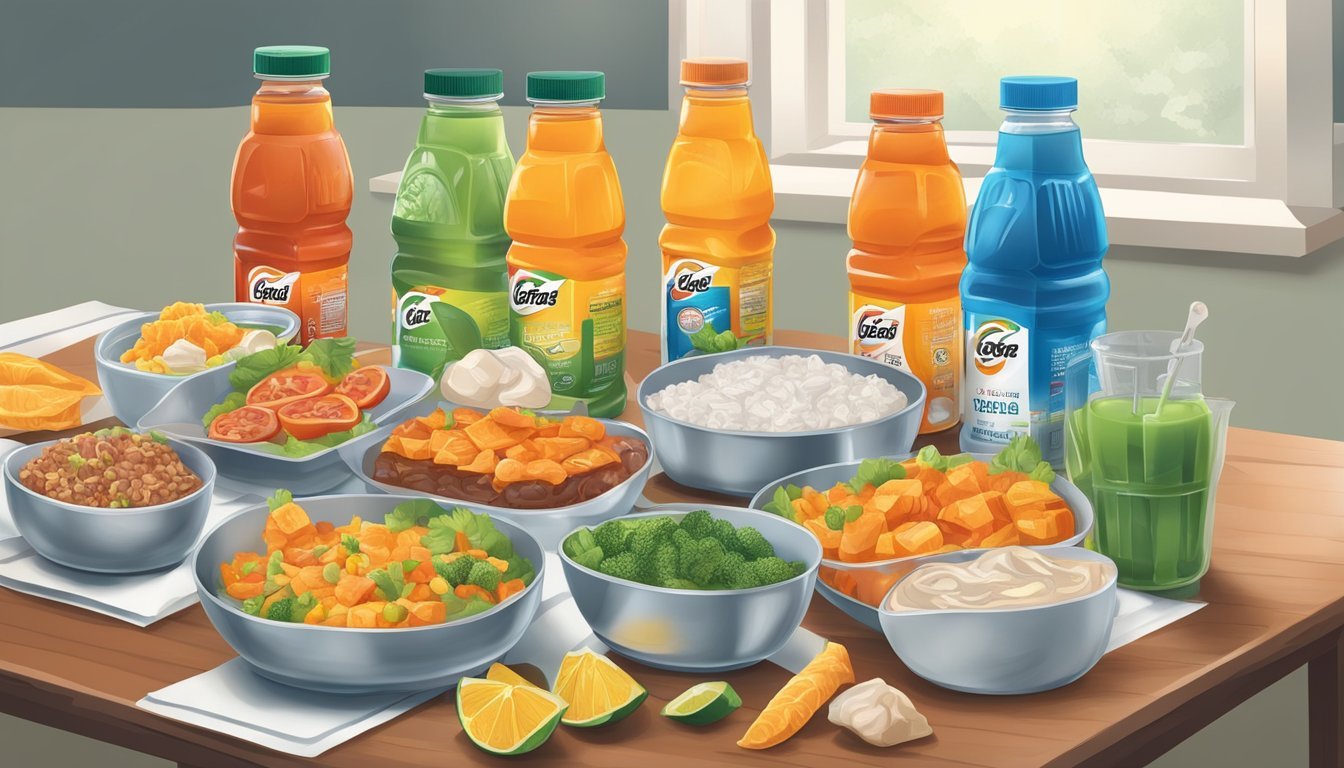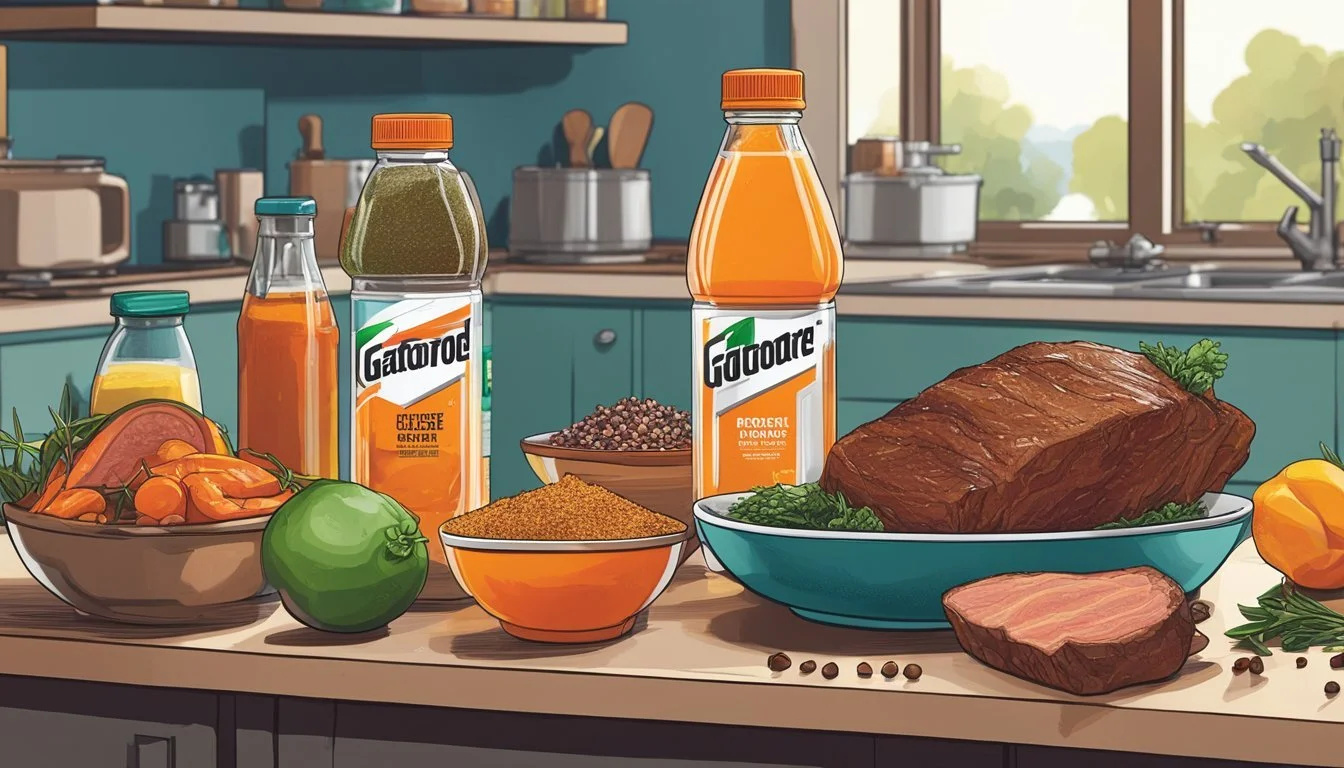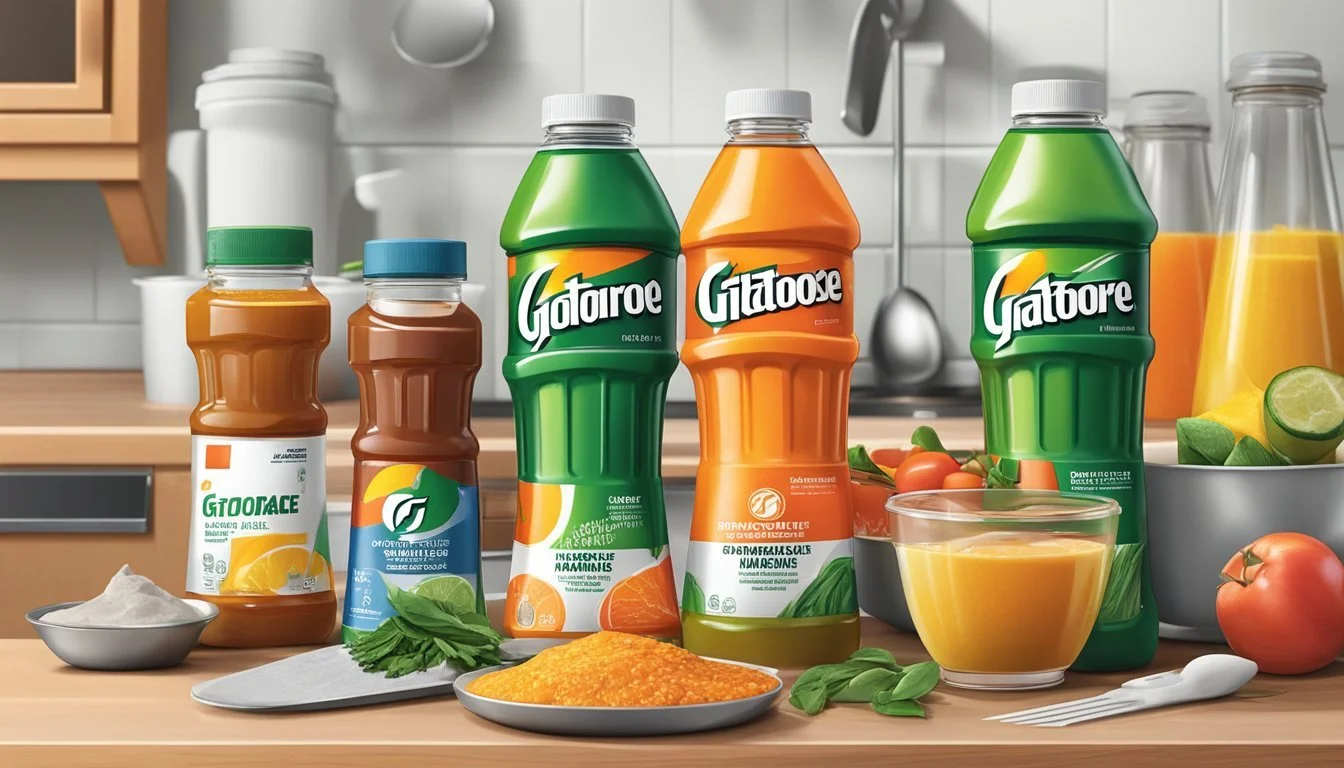How to Cook with Gatorade
Enhancing Flavors with Electrolyte-Packed Marinades
Innovative cooking often means stepping outside the traditional pantry and looking towards unconventional ingredients for inspiration. Gatorade, a beverage typically associated with athletes and hydration, offers an unexpected twist for culinary use, particularly as a base for electrolyte-rich marinades. Its combination of sugars, electrolytes, and variety of flavors can tenderize and infuse meats with a unique taste profile.
Chefs and home cooks alike are exploring the fusion of sports drinks with culinary techniques, bringing a novel approach to marinating meats. While the primary role of Gatorade remains rehydration and replenishment of electrolytes lost through sweat, it also possesses properties that make it suitable for culinary experimentation. The sugars in the drink help in the creation of a caramelized crust when grilling or roasting, while the electrolytes, such as sodium and potassium, can enhance the meat's flavor.
Cooking with Gatorade isn't just about novelty, but about understanding how its components react with other ingredients. Its acidic nature can help in breaking down proteins, making it particularly useful for tougher cuts of meat. By utilizing Gatorade in marinades, one can achieve a balance of sweet, salty, and tangy notes that might otherwise require a combination of multiple seasonings. This approach leads to dishes that are not only enjoyable to the palate but also fun to prepare.
Understanding Electrolytes
Electrolytes are essential minerals critical for maintaining hydration and various bodily functions. Proper electrolyte balance facilitates muscle function, nerve signaling, and fluid balance.
Electrolyte Fundamentals
Electrolytes are minerals that carry an electrical charge when dissolved in water. They are crucial for keeping the body's fluids in balance and are required for the nerves and muscles to function. Key electrolytes include sodium, potassium, calcium, magnesium, and chloride.
Sources of Electrolytes
The body acquires electrolytes from various sources, including dietary intake. Foods rich in these minerals or fluids like Gatorade that are fortified with electrolytes can replenish the body's reserves. Common food sources include dairy products, fruits, vegetables, and electrolyte beverages.
Balancing Hydration and Electrolytes
Maintaining a balance between hydration and electrolytes is vital. When the body loses fluids through activities like exercise, it's not just water that is depleted but also electrolytes. Drinking fluids with electrolytes, such as Gatorade, helps restore this balance more efficiently than water alone.
Effects of Dehydration
Dehydration occurs when the body loses more fluids than it takes in, leading to a drop in blood volume that can cause a variety of health issues. An electrolyte imbalance can further exacerbate these problems, impeding muscle function and causing cramps. Replacing both fluids and electrolytes is crucial to prevent and treat dehydration.
The Role of Gatorade in Cooking
In the culinary realm, Gatorade is not just a sports drink for athletes—it's also a versatile ingredient for cooking, particularly in marinades. This section explores how Gatorade can enhance the flavor and nutritional content of marinades.
Advantages of Gatorade-Based Marinades
Flavor Enhancer: Gatorade is available in a variety of flavors, from classic lemon-lime to exotic fruit punch, which can infuse the meat with a unique taste profile. Its blend of sugars and electrolytes can also help in tenderizing the meat, making it juicier and more flavorful after cooking.
Electrolyte-Packed: Gatorade contains electrolytes such as sodium and potassium. When used in a marinade, these electrolytes can help balance the fluid within the meat, keeping it moist during the cooking process. This can be particularly beneficial for lean cuts of meat that tend to dry out easily.
Gatorade's Ingredients and Nutritional Profile
Sugar Content: It should be noted that Gatorade contains added sugar, which contributes to the calorie content of the marinade. The sugar, while aiding in caramelization and flavor, should be considered if one is mindful of their sugar intake.
Nutritional Elements:
Electrolytes: Vital for maintaining proper fluid balance, these include sodium and potassium.
Calories: Gatorade provides a moderate amount of energy, which can contribute to the energy value of the marinade.
While Gatorade does not contain significant amounts of vitamins or other nutrients, it's the electrolyte content that stands out, making it a suitable ingredient for an electrolyte-packed marinade. Cooks should be aware of the sugar and calorie content when incorporating Gatorade into their recipes to ensure it fits within their desired nutritional parameters.
Crafting Electrolyte-Packed Marinades
Using Gatorade as a base for marinades can infuse meats with electrolytes and a unique flavor profile. This section provides guidance on incorporating Gatorade into marinades effectively.
Selecting the Right Gatorade
When choosing a Gatorade for marinades, it's crucial to consider the flavor and sugar content. Opt for flavors that complement the intended dish—citrus flavors like lemon and lime work well with poultry and seafood, whereas fruitier flavors pair nicely with pork and beef. Low or zero sugar varieties are preferable for a healthier option that doesn't overpower the palate.
Combining Gatorade with Other Ingredients
To balance sweetness and acidity in the marinade, incorporate ingredients like sea salt, which offers trace minerals, and vinegar to tenderize the meat. Adding a touch of honey can enhance the natural flavors without adding refined sugars. Lemon juice is a great addition for its bright, acidic notes that can penetrate and tenderize the meat, complementing the Gatorade base.
Example Composition of Gatorade Marinade:
Gatorade (flavor of choice): 1 cup
Vinegar (apple cider or white): 1/4 cup
Sea salt: 1 teaspoon
Honey or agave syrup (optional): 1 tablespoon
Lemon juice: 2 tablespoons
Marinade Recipes
Below are two simple recipes for Gatorade-based marinades:
Citrus Herb Marinade for Chicken
Gatorade: Lemon-Lime, 1 cup
Vinegar: White, 1/4 cup
Sea Salt: 1 teaspoon
Honey: 1 tablespoon
Fresh Herbs: Thyme and rosemary, chopped, 2 tablespoons
Combine all ingredients, add chicken pieces, and let marinate for 1-4 hours in the refrigerator.
Tropical Marinade for Pork
Gatorade: Fruit Punch, 1 cup
Tea: Hibiscus, 1/4 cup (cooled)
Sea Salt: 1 teaspoon
Lemon juice: 2 tablespoons
Vegetables: Minced garlic and ginger, 1 teaspoon each
Mix all ingredients, coat pork cuts, and marinate for at least 2 hours or overnight for deeper flavor.
Cooking Techniques with Gatorade Marinades
Incorporating Gatorade into your marinades can bolster the electrolyte content while also providing a unique flavor profile. The techniques discussed ensure that the Gatorade-infused marinades elevate the taste and tenderness of your meats.
Marinade Time and Techniques
Marinating Time:
Chicken: 4-6 hours
Pork: 6-8 hours
Beef: 12-24 hours
To achieve optimal flavor and electrolyte infusion, meats should be submerged in a Gatorade-based marinade according to the times listed above. Do not exceed these times to prevent the meat from becoming excessively tender or mushy. For even distribution, place your meats in a sealable bag with the marinade, ensuring all surfaces are in contact with the liquid.
Best Methods for Cooking
Grilling: Ideal for chicken breasts or wings marinated in lemon-lime Gatorade for a citrusy zest.
Roasting: Best for larger cuts such as pork loins infused with an orange-flavored Gatorade marinade to enhance sweetness and moisture.
Pan-searing: Suitable for beef steaks marinated in a bold fruit punch Gatorade to lock in the taste with a caramelized exterior.
Each cooking method should be adjusted for temperature and time based on the type of meat and the specific marinade. Grilling should be done over medium heat to avoid burning the sugars in the marinade. Roasting and pan-searing should likewise respect the balance between achieving a well-cooked interior and a flavor-packed crust.
Post-Cooking Tips
Upon completion of cooking, allow the meat to rest. This waiting period is critical:
Resting Time:
Chicken: 5-10 minutes
Pork: 10-15 minutes
Beef: 15-20 minutes
Resting allows the juices to redistribute throughout the meat, which results in a moist, flavorful dish. For an added flavor boost, consider drizzling a reduced Gatorade marinade over the finished meat, taking care to ensure it's been fully heated to a safe temperature to kill any bacteria from the raw meat.
Pairing Foods with Gatorade Marinades
Incorporating Gatorade into cooking as a marinade offers a unique combination of electrolytes and diverse flavors, enhancing the taste and nutritional value of various dishes. This approach pairs well with whole foods, providing a rich blend of electrolytes such as sodium and potassium.
Electrolyte-Rich Foods
When marinating with Gatorade, it's beneficial to include foods high in potassium and magnesium to complement the sodium in Gatorade and balance the body's electrolytes. Foods like bananas, avocados, spinach, and oranges are packed with these nutrients. They work well when paired with Gatorade-marinated proteins like chicken or tofu. For instance, a spinach salad with Gatorade-marinated grilled chicken slices offers a replenishing meal.
Potassium-rich Foods:
Bananas
Avocados
Sweet potatoes
Magnesium-rich Foods:
Nuts, such as almonds and cashews
Seeds
Leafy greens, like kale
Balancing Flavors
Gatorade has a distinct taste that can be complemented by the natural sweetness of certain vegetables and fruits. Aim to balance the sweet and salty marinade with neutral tasting veggies like broccoli and kale. One can marinate lean meats in a Gatorade concoction and serve them with a side of roasted almonds or lentils for added texture and nutrients.
Suggestions for Food Pairings with Gatorade Marinades:
Chicken + Broccoli
Tofu + Mixed Bell Peppers
Pork + Grilled Watermelon
Healthy Meal Combinations
To create a well-rounded meal, pair Gatorade-marinated meats with sides rich in fiber and healthy fats. Beans, seeds, and nuts not only offer essential fatty acids and fiber but also enhance the absorption of the electrolytes from the Gatorade. A yogurt-based dressing on a salad can make an excellent accompaniment to Gatorade-marinated tofu, offering probiotics along with a creamy texture that contrasts with the marinade’s tangy flavor.
Fiber and Healthy Fats:
Avocado and orange salad
Mixed nuts with watermelon cubes
Lentil soup with spinach
By carefully selecting electrolyte-rich foods, balancing the flavors, and combining them with healthy meal options, chefs and home cooks alike can create dishes that are both delicious and conducive to replenishing the body’s needed nutrients.
Health Considerations
When incorporating Gatorade into cooking, especially for marinades, one must weigh the health implications such as dietary balance, and understand the impacts of sodium and sugar content. The recipes should be adapted for those with specific dietary restrictions.
Dietary Balance
A healthy diet is paramount, and while Gatorade can be a source of electrolytes beneficial for hydration and muscle function, it should be used in moderation within a varied diet. Athletes or individuals engaging in extensive physical activity may benefit from the added electrolytes to prevent muscle cramps and fatigue. However, for those less active, the additional calories could disrupt an otherwise balanced diet.
Understanding Sodium and Sugar Content
Sodium: Gatorade contains significant levels of sodium which is essential for nerve function and muscle contractions, but can exacerbate issues like high blood pressure when consumed in high amounts.
Sugar: While important for energy provision, excessive sugar intake is a concern leading to increased caloric consumption and can impact weight management.
Nutrient Consideration for Consumption Sodium Monitor intake; relevant for those with hypertension or who are sodium-sensitive. Sugar Be aware of total daily intake; can contribute to unwanted weight gain.
Special Diets and Restrictions
Gatorade as a marinade ingredient may not align with certain dietary regimes:
Caloric and Sugar Considerations: Low-calorie or sugar-restricted diets might be disrupted due to the added sugars in Gatorade.
Sodium Sensitivity: Individuals with sodium-restricted diets for conditions like high blood pressure or heart disease should limit the use of Gatorade in recipes.
Age Considerations: The elderly and children may have specific dietary needs. The elderly may be more sensitive to sodium for blood pressure control, and children may require less sugar intake.
Medical Conditions: Those prone to conditions such as fatigue, vomiting, or diarrhea may require careful management of their electrolyte balance but should avoid excessive sugar and sodium.
DIY Electrolyte Marinades and Drinks
Integrating the benefits of electrolytes into homemade drinks and cooking recipes can enhance flavor and nutritional value. Here's how one can create electrolyte-packed refreshments and incorporate them into culinary practices.
Homemade Sports Drinks
Making sports drinks at home can offer a more natural and budget-friendly alternative to commercial options like Gatorade or Powerade. Here’s a simple way to prepare a basic DIY electrolyte drink:
Combine 1/4 cup of lime juice and 1/4 cup of orange juice to supply a refreshing citrus base loaded with electrolytes.
Dissolve a teaspoon of sea salt into 4 cups of water to ensure the essential sodium content is present.
Add a tablespoon of honey or organic agave for a touch of sweetness and additional energy.
Table for Ingredient Ratio:
Ingredient Quantity Purpose Lime Juice 1/4 cup Flavor/Electrolytes Orange Juice 1/4 cup Flavor/Electrolytes Sea Salt 1 teaspoon Sodium Honey/Agave 1 tablespoon Sweetener/Energy Water 4 cups Hydration
Creative Cooking Ideas
Electrolyte beverages are not just for rehydration; they can play an exciting role in the kitchen too. When it comes to marinades, replacing some liquids with a homemade sports drink adds a punch of flavor and nutrients. Here are specific ideas to try:
Soup: For a soup that packs an electrolyte punch, stir in a cup of homemade sports drink to the broth. It adds a subtle tang and replenishes salts lost through sweating.
Marinades: Use the DIY sports drink as a base for chicken or tofu marinades. The acids in the lime and orange juice help tenderize the protein, while the electrolytes can enhance the savory profile.
Smoothie: Add a splash of the homemade electrolyte mixture to a fruit smoothie for an extra dose of hydration post-workout.
Yogurt Toast: For a novel breakfast, drizzle electrolyte-infused honey over yogurt on toast, coupling the probiotic benefits with replenishing minerals.








